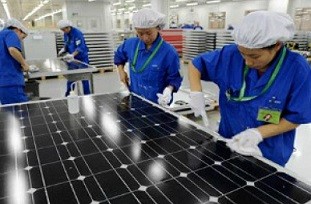The Chinese government has called on the European Union (EU) on Saturday, Dec. 5, to scrap the anti-dumping and anti-subsidy measures, two sets of tariffs imposed on Chinese photovoltaic (PV) exports, amid the EU's plans to launch a review to renew the measures, the Global Times reported.
In a statement released on Saturday, the Ministry of Commerce (MOFCOM) said that the interest of both China and the EU will be affected by the renewal of the tariffs, adding that China hoped that the measures be terminated as soon as possible to "safeguard" trade relations between China and the EU.
The European Commission, the EU's executive body, is set to launch an expiry review of the anti-dumping and countervailing measures applicable to imports of PV modules and key components from China.
The EU said in the statement that the partial interim review will consider whether or not it is in the EU's interest to maintain the measures that are currently in force.
The current measures, which were due to expire on Monday, Dec. 7, have set a minimum price and quota for EU imports of PV products from China. However, they will remain in effect as the review could last for 15 months. The review was initiated following requests from EU producers.
EU ProSun, a group representing solar-panel producers with more than 25 percent of the EU's PV production, requested for the review "on the grounds that the expiry of the measures would be likely to result in continuation of subsidization and recurrence of injury to [EU] industry," the commission said.
In 2012, China and the EU had been engaged in a series of disputes after the EU launched anti-dumping and anti-subsidy investigations into solar panel imports from China. An agreement on the current measures was reached by the two parties in 2014, following high-level consultations.
In Saturday's statement, an official with MOFCOM's Trade Remedy and Investigation Bureau said that the implementation of the agreed measures has been relatively "smooth."
According to analysts, the EU is likely to maintain the trade measures against Chinese PV products, but it will not have a major impact on the Chinese solar industry.
"Having the EU market would be great, but without it Chinese companies will also do well," said Shen Fuxin, secretary-general of the Zhejiang Solar Energy Industry Association.
Shen said that the booming domestic market has benefited Chinese solar-panel makers as they continue to expand into overseas markets. He also noted that the slow recovery in the EU's overall economy has caused a decline in EU solar market.
In 2014, EU's PV installed capacity fell significantly to 7 GW compared with 24 GW in 2012, and EU's share of the world's total capacity plunged to 14.5 percent from 74 percent, according to MOFCOM.
MOFCOM added that employment in the solar panel industry in the region has also declined substantially, as well as the use of clean energy, partly because of large cuts in subsidies by EU member countries and the minimum price restrictions for imports.
Shen said that losses outweigh the gains for the EU through trade measures that limit imports of cheap but good-quality PV products.
Lin Guijun, vice president of the University of International Business and Economics in Beijing, said that although the EU's sluggish economy has caused a decline in China's overall exports to the EU in recent months, the overall trade relations between China and the EU will not be affected by the single dispute.
"The overall trade ties between China and the EU are generally positive," Lin said, noting that cooperation in other areas such as food, autos and high-tech is getting stronger.
"We should not be too sensitive about one sector," Lin said.



























